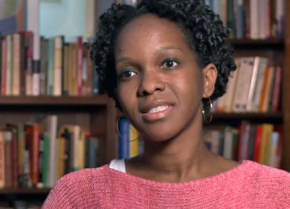Chained to a desk over a parking ticket
reports on a Princeton professor who spoke out about her mistreatment by local cops--and puts her story in the wider context of racist policing.
IMANI PERRY, a professor of African American Studies at Princeton University in New Jersey, became the center of national attention earlier this month when she took to social media to talk about her treatment by Princeton Township police.
Perry, who is Black, was detained for driving with a license that had been suspended due to a two-year-old unpaid parking ticket. Though she posed no threat to the officers, Perry was patted down by a male cop and eventually handcuffed to a table at the police station.
Perry wasn't physically harmed during the process, but her arrest and treatment caused a stir because, like the 2010 arrest of well-known Harvard professor Henry Louis Gates, it showed that even attaining a prominent status in academia doesn't prevent Black people from being racially profiled.
On her Facebook page, Perry put her experience in the larger context of racist policing across the country:
I am also, however, trying to connect how terrified and vulnerable I felt, with the vast structure of the police state, the one in which people are arrested for parking fines, and then are threated with sitting in jail all weekend if they can't make bail and the snowball effect that so often flows from situations like this, or others where there is another minor infraction, or simply suspicion of Black movement, Black bodies in nice cars, Black running or walking or standing, or simply Blackness. The worst-case scenario didn't happen to me, and that was nothing more than fortuitous. But I'm putting my fear alongside others tragedies, and rededicating myself to the work of liberation.

ACCORDING TO a tally compiled by the Guardian, 1,205 people were murdered by the police in the U.S. in 2015--and Black people were more than twice as likely to be victims as other Americans.
Although Black men bear the brunt of police state violence, Black women have also been subject to police brutality. The growing number of women of color that are killed at the hands of U.S. law enforcement officials is still being counted by activists and news agencies.
The recent media coverage has shown what most Black Americans already knew: The police are not here to protect Black citizens. Over and again, Black bodies have been a target of violence at the hands of law enforcement officials.
A few days after the incident with Perry, Princeton's African American Studies department held a previously scheduled forum called "Causes and Consequences of Racial Bias in Law Enforcement," at which some attendees touched on the campus context for racially biased policing in America.
Perry's colleagues in the department issued a solidarity statement expressing their outrage with her treatment and called on the Princeton town and community to question the ways policing disproportionately targets marginalized groups.
Perry's own scholarship, the statement said, has demonstrated how "members of marginalized groups--Black people, immigrants, transgendered people, and those who live in the intersections of inequality--are disproportionately and systematically disadvantaged compared to others within the criminal justice system and beyond."
Predictably, local authorizes are ignoring this call for self-reflection. Instead, police released selective dash-cam footage of their encounter with Perry that does not include the moments about which she complained. The Mercer County Prosecutor's Office said it found no wrongdoing on the part of Princeton police.
In response, Perry said that this was part of the problem:
The officers have emphasized that their actions were consistent with standard protocol. But I don't disagree with them on that point. I never did.
My point is this: Regardless of whether it is consistent with standard procedure and protocol, I should not have been handcuffed to a table for a parking ticket. Moreover, if it were five parking tickets I should not have been handcuffed to a table. A parking ticket is not an indication that a person poses a physical threat. The "pat down" for weapons that I experienced at the hands of a male officer also did not make sense as I did not pose a physical threat and I was not stopped on suspicion of posing a violent threat to anyone.
And here is the point that goes far beyond my story: Perhaps if police officers were not authorized and encouraged to arrest people for small violations, then Eric Garner and Sandra Bland would still be alive.
ALTHOUGH IMANI Perry was not subject to the same fate as other Black women such as Tanisha Anderson and Sandra Bland, her case points to a particular justice issue that disproportionately targets the poor people and people of color.
States throughout the U.S., including New Jersey, use traffic violations and penalties to generate revenue, giving an incentive for law enforcement to hand out tickets to drivers, thus producing a system in which police are debt collectors, and people face a "choice" of paying now or going to jail.
Because Black drivers are stopped and searched more than twice as often as white drivers, African Americans are more likely to have to have their cases lead to an arrest warrant--as in Perry's case. Driving violation surcharges and the point system make it so that if you are poor and Black, you can easily be subject to be profiled and arrested.
To prevent Black people from being targeted by the police, we need to organize against racial profiling and demand that the state stop penalizing people who cannot afford to pay traffic violations. This is not just about police diversity or sensitivity training but challenging a system that profiles, arrests and murders people just because of the color of their skin.
History is often told from the narrative of the victor, but the proliferation of grassroots movements and collective action against police violence will be a testament that Black lives can only be resilient when they challenge the entire criminal injustice system.


